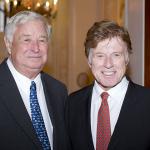Not this week’s news, though the hypocrisy of evangelicals does continue to drive a certain narrative flowing from the 2016 presidential election (if only we can link Billy Graham to Russia). Scholars who study evangelicalism are trying to make sense of the election fall out and some are questioning whether the categories in play are actually correct.
Timothy Gloege, for instance, almost single-handedly wiped out three rows of library bookshelves recently when he questioned the most common definition of evangelicalism — namely, David Bebbington’s “evangelical quadrilateral”:
Like using water to define Kool-Aid, Bebbington’s definition confuses common, ill-defined, features of Protestantism or Western Christianity for evangelical particularities. Evangelicals love it because they can do theology—make theological claims—under the guise of analysis.
Why, then, do so many scholars of evangelicalism keep using it? Perhaps it’s because many are evangelical themselves. Or perhaps they don’t realize what they’re doing. Whatever the cause, the definition needs to be retired.
Historians have started talking about evangelicals in new ways. But until the dust clears, it is especially important to interrogate all definitions, new and old, to distinguish the scholarly from the partisan.
So too, Trevin Wax felt compelled recently to distinguish Bebbington’s religious definition from the cultural or political traits of people who self-identify as evangelical:
Do we define evangelical by those who identify as such? Do we define evangelical the way political pundits do? Or do we define evangelical by core doctrinal commitments?
I vote for a variation of the doctrinal definition, but I do so with eyes wide open to the fact many more claim the label, while many who fit the doctrinal description don’t want the label at all. I don’t think we can dismiss self-identifying evangelicals who hold to theological or political positions we find problematic (whether on the political right or theological left). Neither can we dismiss brothers and sisters who hold tightly to evangelical distinctives and yet want nothing to do with the label.
Right now, I’ve got a two-track understanding of evangelicalism, a way of holding together an aspirational definition and a cultural one. There is evangelicalism as a renewal movement based on common beliefs and distinctives and evangelicalism as a sociological and political phenomenon. The first is more aspirational and more closely aligned to the movement’s roots (as well as its global connections), while the second is a sociological manifestation of varying traits of evangelical culture (even if the core beliefs and distinctives are no longer present).
What both scholars fail to mention is that the entire enterprise of evangelical studies grew up in the setting of born-again Protestant support for Ronald Reagan. In other words, scholars started trying to figure out what evangelicalism and fundamentalism were precisely when those Protestants started influencing electoral politics. Just go to the library and do a search for books on evangelicals and you will see a dramatic uptick in the 1980s.
This means that the universities that held conferences, the editors who read book proposals and offered contracts, the foundation officers who underwrote grants for the study of evangelicalism — none of these things would have happened if evangelicalism had not been primarily a topic that bore directly on national politics. See if you can persuade a professional academic society to devote several sessions of one of its annual meetings to the Amish or even to Lutherans, simply to understand these persons’ religious beliefs. But tie those believers to a political or social development of some national import, and you will likely make a better case.
The study of evangelicalism did follow David Bebbington and ignored the political circumstances that made the study of born-again Protestantism appealing. Historians generally tried to understand the religion. But the only reason why anyone who wasn’t an evangelical cared was because folks like Jerry Falwell, James Dobson, and Pat Robertson were showing up on the radar of national politics.












